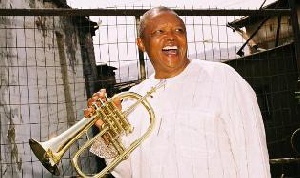No, John Coltrane hasn't performed a physical transfiguration. But he's alive and well – at Adenta!
By name only, I must hastily add – Adenta, that ever-effervescent suburb of Accra notorious for its traffic jams and near-misses, where impatient trotro drivers join the highway in erratic manoeuvres that would be envied by the starlings of the sky – has got itself a jazz club. And it's named after “Coltrane”, that great American tenor saxophonist.
And – it's a proper jazz club! The eccentricity begins to insinuate itself as one climbs a flight of steps and gets on to a long corridor. There are no lights in the corridor! Is there really a club here, members of my party wonder. But we are reassured when we hear sonorous sounds emanating faintly from somewhere.
We open a pair of doors, and they reveal a dimly-lit, not-so-long bar. When the eye adjusts to the scene, it rests on an assortment of casually-dressed folks.
As familiarity now begins to dawn, one remembers that coming upstairs and along the corridor, one had espied, in the half-light, what a closer inspection reveals to be stunning photographs of great jazz men and women doing what they do best: making music. Ahah! That's Coleman Hawkins, abi? Why, they've got Ben Webster! And, of course, John Coltrane. Surely, that is Billie Holiday?
Yep! Someone has imagination in Accra!
“Coltrane Jazz Club”, Adenta, is certainly, the real McCoy. Sumptuously furnished, the atmosphere is relaxed; and both food and drink are sold. But thankfully, no-one smokes in there! Can jazz and a healthy atmosphere go together? Apparently, at Coltrane, it does.
The occasion is to be credited to the recent sad demise of Hugh Masekela, the great South African trumpet player and singer. Coltrane Jazz Club put on a show in his memory on Saturday 27 January 2108. It was a proper audio-visual display, topped with personal reminiscences by live guests.
Now, people know of Hugh Masekela as a great musician. What's not generally realised is that he was also a great humanitarian who supported many human rights causes. At this memorial, the humanitarian cause is highlighted by footage of an event in aid of the people who were suffering at Darfur through – Sudan's horrendous oppression of that region.
Ever heard of the “jinjaweed”? Well, Masekela was so moved by the tortures that this band of marauding enslavers were inflicting on Darfur's population that he travelled to Accra to take part in events meant to help draw the world's attention to the tragedy. The event was in aid of an African atrocity being denounced by Africans on African soil. Hugh was more than willing to be co-opted to assist with his talent and to lend it his spirit of struggle against oppression.
After Prof Karikari had presented the audience with the rationale of the event, he generously introduced me to the jazz lovers and asked me to say a few words.
I emphasised that Hugh Masekela, the supreme musician, was also a great intellectual. He could view the world through a lens patched together with incisive analytical prowess.
He fully appreciated the value of Africa's contribution to world culture, and so consciously promoted the beat that had permeated his being as a child. He absorbed this from the songs of the miners and other lonely migrant workers, who came to drown their sorrows in his grandmother's [illegal] shebeen (drink den). They were a polyglot lot, from as far away as Malawi, as well as nearby Lesotho, Botswana and Swaziland. Mozambique and Angola also contributed their quota of migrants and their music.
The songs they sang were all different, as indeed were the songs of the Zulus the Xhosas and the San from South Africa itself. But it was all BEAUTIFUL AFRICAN MUSIC, and Hugh Masekela drank it in That bubble of aliveness that's ever present in his music, then, came from the very heart of the Continent that constitutes the very Source of World Rhythm, (I said)
Masekela's peculiar genius lay in cleverly fusing Western music into the varied strands he appropriated from the forests of African. So successful was he in this “super-nuclear-fusion” of African and Western musical idioms that, a mere eight years after leaving South Africa , he was able to produce a song, Grazing In The Grass, that not only topped the American pop chart in 1968 but stayed on top of it for three weeks solid.
Now, this was the era of great American and European pop stars: Aretha Franklin was there; so were Dionne Warwick; Wilson Pickett; the Beatles, the Who and many other great artists. And yet a man who had deliberately been shut out of the best and most lucrative musical avenues in his own country by the laws of apartheid went to America and displaced the stars of the day. For three whole weeks.
Grazing on the Grass? What could an American pop scene pasted over with sophisticated hallucinogens (like LSD and/or heroin) find enticing in the artistry of a musician reared in the cattle-breeding “Tarzan-type “jungles” [to most Americans] of Zululand?
Was it the mention of the word grass in the title of Grazing in the Grass that touched the psyche of a Young America that was imploding in 1968? Was the vista of peace conveyed by the theme of the song a silent message in code to a generation of Americans that was reeling from the lunacy of the brutality their country was sadistically inflicting on a tiny country far away called Vietnam?
Certainly, the youth of America and Europe were grazing in “grass” (metaphorically and sometimes literally!) while their parents were bombing Vietnam “back to the stone age!” A veritable miracle occurred in the subconscious of America's musical clientele, propelling Hugh Masekela into fame and fortune. The success of Grazing in the Grass was a godsend. But America exacts a high price for the fame and fortune it bestows on artists, and Hugh could not escape this. For a time, he became a victim of drug and alcohol abuse and had to seek rehabilitation.
Fortunately, he survived. But in the meantime, he'd become the target of the attentions of the nefarious BOSS (Bureau of State Security) organisation which the apartheid regime deployed both at home and abroad to waste anti-apartheid activists whom t could not suborn. Masekela was approached and promised that if he returned home, he would be accorded the status of “honorary white person”. He told the apartheid spy to go to hell. Whereupon the agent uttered a death threat against him. Before Masekela could call the police, the would-be assassin had deftly vanished into the shadows of New York City, from whence he'd come!
I recounted all this at the Coltrane Jazz Club. If you want to taste what the club has to offer, go to its website – www.coltraneclub.com. And: http://gh.wowcity.com/accra/gplisting/ChIJq-BWnD-d3w8Rwv4ti_jyK-0/5.708046499999999/-0.16607699999997294/Coltrane%20Jazz%20Club.htm?address=Adenta%20Municipality,%20Ghana&rating=3.7®ion_id=1893&city_id=3949&country_id=92
For me, the evening's greatest thrill was to hear the name, “Akwasi!” trill into my ears from the golden voice of a friend I hadn't seen for about 35 years – that intellectual power-house, the feminist champion, Takyiwa Manu! She tells me she's “now retired” even though she's very well-preserved indeed, and could go on lecturing about Pan-African and Gender issues for another 10 years or more, if she so chose.
Opinions of Tuesday, 30 January 2018
Columnist: Cameron Duodu















